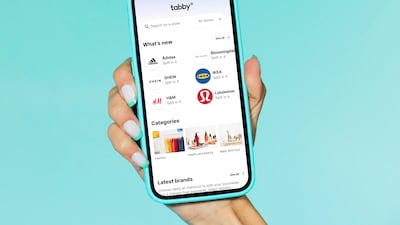Investments in the FinTech sector will continue to remain on venture capital and investment funds’ radars, despite slowing economic growth and mounting worries about a global recession.
Although the pace of investment has moderated and investors are more careful about which start-ups they finance amid macroeconomic headwinds, the FinTech sector in the GCC remains attractive, boosted by the relative strength of region’s economies on the back of higher oil prices, experts said during DIFC FinTech Week, a two-day event for key FinTech players to discuss the future drivers of growth in financial services.
“It [FinTech] has a very high 'investability' in the market versus other sectors because of the attractiveness and 'understandability' around its economics,” said Sharif Elbadawi, chief executive of Dubai Future District Fund.
“I think it’s going to remain the lion's share for some time.”
Last year, venture capital (VC) companies invested about $500 billion globally in start-ups and a total of $7.5bn of that was invested in the Africa, the Middle East and Pakistan region. FinTech sector ventures accounted for the lion's share both in terms of the deal flow and the amount of capital deployed, according to Philip Bahoshy, founder and chief executive of data platform Magnitt.
In the Middle East, the FinTech sector is undergoing rapid expansion. By 2022, more than 800 FinTech companies operating in different segments such as payments, InsureTech and cyber security are projected to raise more than $2bn VC funding to boost their growth, UAE lender Mashreq said in February, citing data from the Middle East Institute.
“Irrespective of what's happening globally, irrespective of the views about global recession, technology is here to stay. It is only getting better,” Faisal Belhoul, chairman of Dubai-based The Latest Ventures, said.
"The global megatrends on technology theme is going to continue. It's just a matter of having the right discipline to invest at the right valuations in the right situations and continue to take advantage of the field.”
The countries in the six-member economic block of the GCC are enjoying “relative isolation” in terms of the impact that inflation and recession worries have had on the rest of the world.
Higher oil prices have shielded the Gulf economies and the regional FinTech sector still remains attractive for investors, Mr Belhoul said.
Globally, digital payments are expected to grow to $8.26 trillion by 2024, from $4.4tn in 2020, according to Statista.
The buy now pay later (BNPL) segment within the payments industry has also seen a rapid growth in recent years. Globally, BNPL transaction values are projected to grow to $576bn by 2026, from $120bn in 2021, according to data analytics company GlobalData.
BNPL accounted for 2.3 per cent of the global e-commerce market in 2021. In other words, for every $100 spent, $2 went towards a BNPL transaction, according to the report.
The BNPL business model, which allows consumers to make online purchases and spread out their interest-free repayments, has gained a lot of traction in the wider Middle East and North Africa region since the onset of the coronavirus pandemic, experts said during Tuesday's forum.
BNLP has become a necessity in the Gulf, enabling consumers a payment option as credit card penetration remains low compared with advanced economies, said Abdulmajeed Alsukhan, chief executive of Saudi Arabia-based BNPL company Tamara.
“It's very clear that in some markets it's nice to have [this option] and it's a bit more of a luxury in certain [other] markets and definitely, [in a market] like ours, it's pretty much a necessity,” Hosam Arab, chief executive of UAE’s BNPL venture Tabby, said.
“When you look at a market like the US where credit card penetration [is] close to 70 per cent … a third of US consumers have three or more credit cards. That's definitely not the case [here].”
Saudi Arabia, the Arab world's largest economy, has credit card penetration of 13 per cent to 15 per cent, while in the UAE it is somewhere around 40 per cent, Mr Arab said.
“There is a major gap of consumers that just don't have access to that alternative,” he added.
The rapid growth of the BNPL model in the region, driven mostly by Millennials and Generation Z, has attracted a lot of investor interest in the past few years.
Last year, while Tabby raised $150m, Saudi Arabia's Tamara raised a record $110m in a series A round.
Global players such as Apple are also jumping on the bandwagon, as the iPhone maker unveiled a financial product, called Apple Pay Later, which allows users to split the cost of an Apple Pay purchase into four equal payments over six weeks without being charged interest or late fees.
However, BNPL platforms will have to maintain a delicate balance between chasing growth and managing risk and should be careful about how they underwrite credit in the economic and financial scenario, Mr Alsukhan said.


